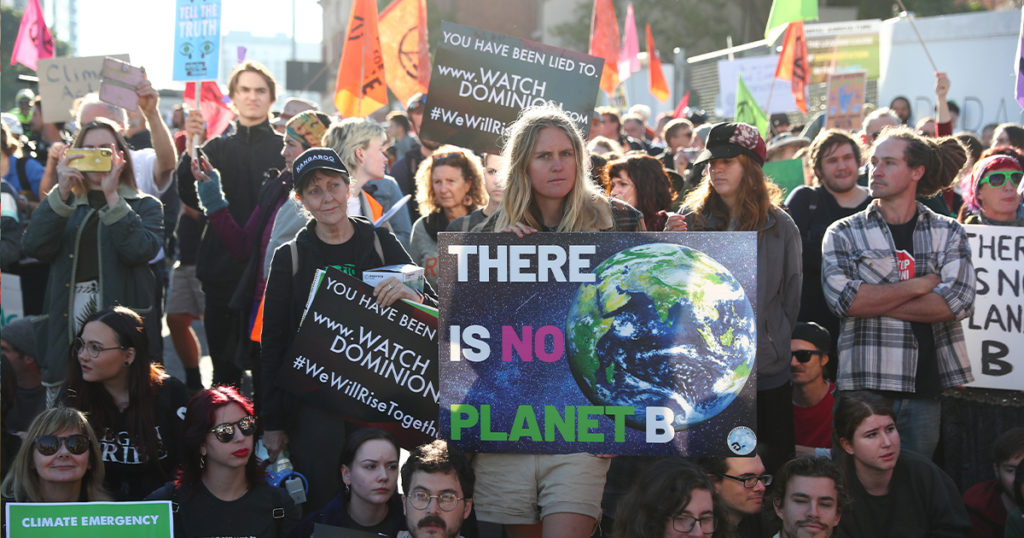Nathan Gardels is the editor-in-chief of Noema Magazine. He is also the co-founder of and a senior adviser to the Berggruen Institute.
“The central feature of contemporary populism is that it is anti-representational,” William Davies writes this week in The WorldPost. “It opposes representative democracy (favoring plebiscitary alternatives) and professional media (favoring social media or simple propaganda). In place of representation, it favors presentation. This is well-exhibited by a phenomenon such as the Gilets Jaunes (Yellow Vests), the French mass movement against economic injustice, in which a political entity comes into being with very little representational consensus on aims, objectives or policies but is primarily constituted by its presence on the streets and on social media.”
This mobilization politics of “presentation” instead of “representation” will surely be a permanent feature of the future because the advent of social networks enables a perpetual challenge by disaffected constituencies to the authority of governing elites everywhere.
“The genie will not be easily put back in the bottle,” says Davies. “Democracy and authority in the age of the digital platform are qualitatively different, allowing outrage to move virally and unpredictably. Being mobilized offers forms of embodied, emotional experience that being represented never does. Examples include Youth Strike 4 Climate, an international movement of school strikes led by students demanding climate action, and Black Lives Matter, which uses human bodies to jam infrastructure such as highways and airports. As new movements like this have understood, presenting the people in public — especially those most vulnerable — is now as much a part of democracy as representing them.”
As acts of rebellion, events of “presentation” are a cry for justice. They don’t amount to a system of governance, as Davies points out, that will empower people to take back control and own their future.
Outrage at unresponsiveness by those in the halls of power will always drive the disaffected into the streets and onto the web. But the entire body politic will not somehow be perpetually mobilized into activists, spending all their free time studying the issues, tweeting storms and turning out in droves to demonstrations. The average citizen is by and large way too busy with work and family to engage actively on an ongoing basis in politics, and there is no indication that is what they want.
Rather, the idea of “participation” behind acts of “presentation” should be read as a demand for the reliable expectation of a process in which all voices are heard and weighed among others in decisions that affect each of our lives. If the operational practices and institutions of self-government are considered impartial and inclusive, citizens will accept the outcome of the competition over ideas and interests as fair — even if they end up on the losing side of a dispute or get only half a loaf through trade-offs that enable a consensus. It would be going too far to say that governance works best if there are “happy losers.” But it would be appropriate to say that when citizens are satisfied that the process is legitimate because it has not excluded their express concerns, they will not become disillusioned with the system.
The growing appeal of direct democracy is precisely this: Citizens know there is a ready venue for their immediate “agency” when elected representatives captured by an insider establishment of organized special interests neglect, or are unwilling to address, issues of primary concern to the average person.
What makes mobilization politics and its corollary of citizen-initiated referendums different from the past, as Davies also notes, is the scope and scale of social connectivity that fortifies it. Indeed, if unmediated, direct democracy in the digital age will look a lot like social media itself. It will encompass the good, the bad and the ugly, a platform not only for the spread of innovative ideas that respond to citizen concerns, but for ill-tempered blog-mobs, hateful sentiments, alternative facts, outright lies, utopian delusions and worse.
All this presents a paradox for governance in the digital age: The more participation there is, the greater the need for the counterbalance of impartial practices and institutions that can process the cacophony of voices, sort out the deluge of contested information, negotiate fair trade-offs among the welter of conflicting interests and dispense with the magical thinking or xenophobia that comes along with networked popular sentiment. In this new era of distributed power, such a deliberative ballast — whether through citizens’ assemblies and policy juries (which bring together average citizens with non-partisan experts to reach a consensus based on verified facts) or a “second reading” by the upper house of legislatures — is as essential to the survival of republics as the direct engagement of citizens in governance.
The exercise of collective intelligence requires cool and sober deliberation that enlarges the public view even more in the digital age than in the era of the American Founding Fathers and others who designed the constitutional frame that has enabled the liberal democracy we have so far known. If the ethos of the digital disrupters has been to “move fast and break things,” the counterpoint of 21st century democracy must be to “move deliberatively and fix things.”





